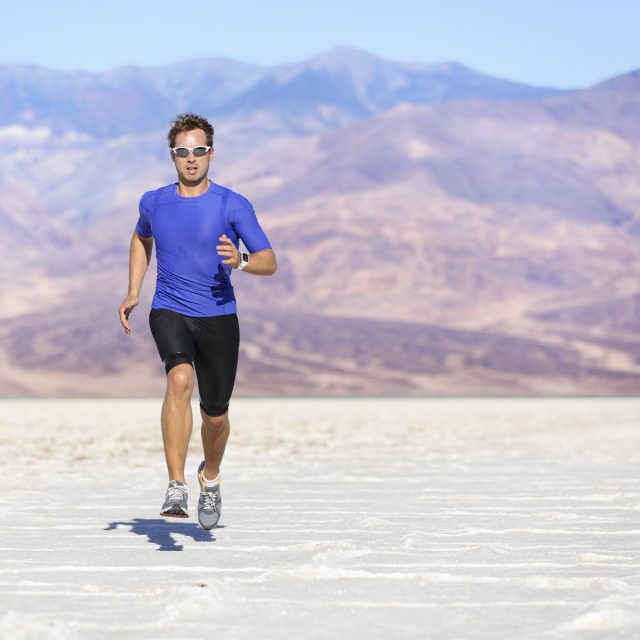Your running heart rate may vary from one training session to another, depending on the intensity of your run, of course, but which other factors may influence your heart rate while running?
- Type of exercise
- Heat and humidity
- Hydration
- Altitude
- Energy levels
Imagine this.
The sun is beaming down on you. Your feet are pounding on the hard asphalt as you climb higher towards your favorite vantage point over the city. All you hear is the birds chirping. And your heart beating. Fast.
Actually, it’s beating faster than usual. You check your heart rate monitor. Your heart rate is 8 beats faster than usual.
“What? Is this normal?” Yes, it’s perfectly normal. If you’ve been monitoring your heart rate while running over a longer period of time, you know that it changes from one training session to another. The same route that felt easy yesterday might suddenly feel like someone set your world at a 2% incline.
The intensity of your training and your current level of aerobic fitness influence your heart rate, but moreover, these five factors may also explain changes in your heart rate while running.
1. Type Of Exercise (duh!)
Heart rate changes across activities as you’re using different muscles and working out on different intensity levels.
For example, running an obstacle course activates large muscle groups and is decidedly different than doing super sets on your biceps brachii at the gym.
Running typically elicits the highest maximum heart rate during a stress test, whereas in cycling or paddling, maximum heart rates can be 10–15 beats lower during the same test.
2. heat and humidity

As things get hot and humid, your heart rate usually goes up. In fact, your heart rate will gradually increase throughout your run, even if your pace doesn’t change.
Your body tries to cool itself down during exercise, typically by sweating. Humidity reduces the effectiveness of sweating, which means your body temperature goes up – together with your heart rate.
If it’s hot but not humid, like on your typical Sunday run in the desert, your heart rate will still be elevated because of the extra work the heart must do to help cool your body.
In these conditions, your heart rate could be 5–10 beats above normal ranges. No need to sweat, though: you can use your heart rate with perceived exertion and subjective feeling to set an appropriate pace.
3. Hydration

We need water – lots of water.
Sounds easy enough, but it’s also easy to forget the three key to-dos when it comes to staying hydrated: drink, drink, drink.
If you’re not properly hydrated, your heart rate can increase because your blood volume decreases and your body runs low on the fluids it needs to maintain body temperature.
And it’s not just in the desert where you can get dehydrated. It can occur in cold as well as hot environments.
If you notice your heart rate increasing with no change in pace or other variables, it might be a good idea to increase your fluid intake.
4. Altitude

There’s a reason why climbing Mount Everest is so hard. Actually, there are several reasons but what we’re talking about now is the lower air pressure at altitude.
With lower air pressure, there is less pressure to drive oxygen into your lungs. Less pressure means your heart has to work harder to deliver enough oxygen to your working muscles. And again, we get a higher heart rate at a given pace.
Fortunately, your body adapts to higher altitude over the course of several days to 2 weeks. If you’re just visiting the Alps, you’ll need to slow down your pace to keep your heart rate in the proper range. And before you go all out on those mountain roads, remember that it takes longer to recover from a hard effort at altitude.
So, train hard and rest harder.
5. Energy levels
There are three different sources of energy for your body: carbohydrates, fats and proteins.
As the exercise intensity increases, you burn proportionally more carbohydrates and less fat. (Protein metabolism is always fairly small.) And even at low intensities, you always need some carbohydrate to burn fats.
But what does all this have to do with your heart rate?
If you start to run low on carbohydrates, you’ll find it difficult to maintain your pace at a given heart rate. Your perceived exertion and subjective feeling will increase. In other words, you’re more likely to promise yourself never to run again. Ever. And while you’re doing that, your heart rate will be falling.
This is informally called “bonking” and can be remedied by eating foods high in carbohydrate. As a rule of thumb, always bring along some form of ingestible energy on any outing lasting more than 2 hours.
If you liked this post, don’t forget to share so that others can find it, too.
Or give it a thumbs up!
I like this article
Please note that the information provided in the Polar Blog articles cannot replace individual advice from health professionals. Please consult your physician before starting a new fitness program.





